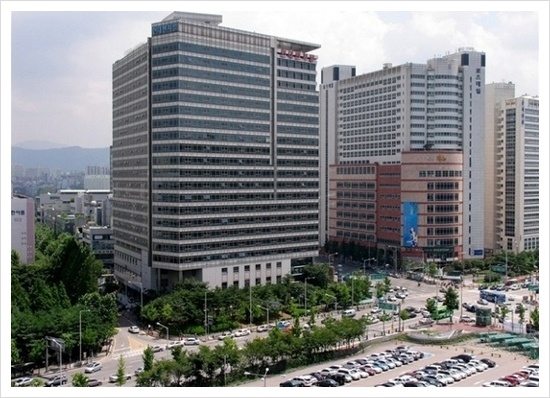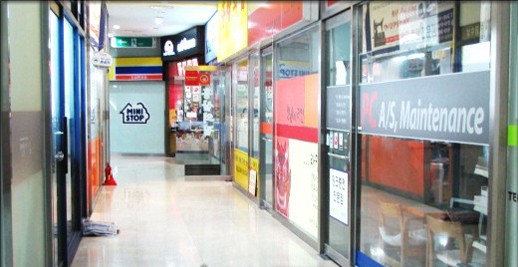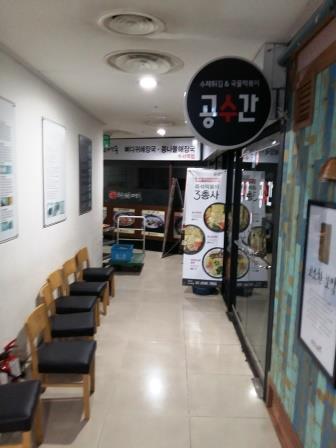By Iwazaru
At 2 a.m. on a cold night in late December, I finally decided to enter the Suseo Hyundai Ventureville building, which is attached to Suseo Subway Station and has, among other things, banks, a 24-hour convenience store and sauna, restaurants and shops. I had put myself in this situation by leaving a social engagement in central Seoul a bit late and riding the subway until it stopped, at which point I felt confident that I’d just hail a taxi for the 30-mile ride to my apartment in the bucolic outskirts.
Alas, my plans fell apart.

I had forgotten that hailing taxis at night in Korea can prove difficult. Korean taxi drivers have a reputation for refusing riders as they try to optimize potential follow-up fares. The trick, my Korean brother taught me years ago, is to just get in and close the door (most people ask through the window or a cracked door). As I competed with numerous other Koreans hoping to head home via taxi, I was expelled from the back seats of six separate cabs over an hour by drivers who simply said they were not going that far or who just waved their right hand, sending me back to the street. Unbelievably, the trick had completely failed for the first time—0 for 6. It was around 1 a.m.
Defeated, I chose to walk the freezing block to locate a motel. Aren’t love motels ubiquitous in Seoul? Here I was in Suseo, a bedroom ‘burb of apartment blocks where people apparently don’t go for anything else but to commute. Street after street, corner after corner, I saw only apartments and office buildings. Looking at a map later, I would see apartment complexes, a giant commuter parking lot, schools, several parks, a mountain and stream.
For an hour I circled the surprisingly silent neighborhood until I arrived with confoundment back at the Ventureville building. In retrospect, I think I could’ve tried to taxi back into central Seoul but I instead walked into the Ministop convenience store, bought a bottle of water and exited through its rear door into the public building.
My thinking was that I’d find some spot to comfortably sit or lie, doze a bit and wake at 5 a.m. to catch the morning subway. It didn’t seem outlandish. Although I’d knocked back a few in Seoul, I felt mostly cold and tired. As I surveyed the building, I noticed an old security guard strolling off down a corridor and what looked like cleaners descending stairs to the basement floors, which connect to the subway station and house closed restaurants.
The sauna was down there too. I followed the cleaners, figuring I could find a quiet spot. Everything was well lit and around a back corridor of B1 I found a line of chairs against a wall opposite the front door of a restaurant. A waiting area perhaps? I put down my bag, took off my coat and lay flat along the chairs. I could hear what sounded like the cleaners gabbing in the distance as I drifted into a loose sleep.
It bears mentioning that I’ve lived in Seoul for most of a decade split by a return to grad school. Not once during that time have I felt unsafe, except, maybe, for the initial ride from the airport during which a compact Korean man in a leather jacket sped, swerved and sliced his way down the expressway.
I’ve walked the streets many a late night, I’ve traveled much of the peninsula, and I’ve hung with some suspicious characters but not once have I felt looming danger. Almost everyone I know reports the same sentiment. Even the U.S. Department of State lists Korea’s crime rate as low. So when I laid my head down that cold December night, my main concern was someone kicking me out into the cold.

Some time later, I felt a poking on my shoulder and saw two elderly Korean security guards, grandfathers who should have been home sleeping in this Confucian culture. I knew what was coming. Although what I heard confused me, as they said, “You should not sleep here on these chairs.” This wasn’t the Korean “Get out.” Then they shuffled off, their navy uniforms hanging off their frail frames. It was 3 a.m. Knowing they would return, I gathered my stuff and started off. Then I stopped, checking my essentials.
Where was my wallet? Hadn’t I taken it out of my pocket and put it in the bag so I could lay flat without discomfort? Or was it in my coat? Or had it fallen under the chairs? In disbelief, I searched through everything, again and again. Doubt set in. Had I actually had it when I laid down? Yes, I’d bought the water. Again, I checked under the chairs. Nothing.
Finally, in a panic, I sought out the security guards to tell them that my wallet had been stolen. “Call the police,” they advised with little concern and tired eyes, adding that crazy people often come through the building at night–and some use the sauna.
Piecing together what I would tell the police in Korean, I noticed a Korean man in a baseball cap, a puffy jacket and sweatpants across the lobby standing outside the Ministop. He looked concerned and began to approach. “You need my help,” he said as he neared. I wondered from where he had appeared. “My name is Min and I live right there,” he said pointing out the rear entrance of the building to an apartment complex. I shook his hand, told him my name and explained the predicament. He called the police.
Fifteen minutes later two police officers arrived, an older heavyset man and a younger, leaner sidekick, both in grey winter police coats and uniform caps. At this point, it struck me how incredible my narrative sounded. And as I tried to explain, with Min’s assistance, the four of us descending the stairs to the scene of the supposed crime, I could see on the officers’ faces that they wondered why I hadn’t gone home. What was I doing here? They asked repeatedly if I had been drunk, even though I’d been there for almost two hours and I was not stumbling and bumbling. Yet, after all, why would any sober (and sane) man, especially a foreigner, choose to sleep in the basement area of a public building at two in the morning on a weeknight? With this understandable scrutiny came the tacit doubt about whether I even had my wallet upon arrival. Fortunately, I had the water bottle or I might have doubted myself because there seemed nothing comprehensible about my missing wallet.

I sense there is a fairly common shock that comes over most people when they lose a long-owned wallet or pocketbook. I consider myself slightly old-school because I carry a thick wallet with too many things in it, most that I probably would never need: business cards, some going back 15 years, foreign currency, old notes, a few pictures, a mini knot tying guide, an old college ID, two hospital ID cards, department store gift certificates, two library cards, a CVS rewards card.
Far more important, the wallet contained my alien registration card, aka the ARC, which had required a Korean embassy visit for a passport visa stamp, a full health check, a signed contract and business records from my employer, an FBI criminal background check apostilled by the Secretary of State’s office, an apostilled copy of my college degree, and whatever time and cash all that required. That card was the first singular thing that came to my mind beyond the collective valuable mass tucked inside that small leather billfold.
But I hadn’t tried to think of everything that was in the wallet—I hadn’t wanted to—until the police asked me to recall it for them. The ARC, some cash (how often do you know exactly how much cash is in your wallet?), my credit card—that’s what I first told the police.
The officers urged me to cancel my credit card despite my reluctance, which came from knowing that I’d get a phone alert as to if, when and where it was being used. Still, I relented and pulled my 13-digit alien registration number out of my head along with a few other things. Yet, ultimately, the police could do little more than get my story, see that my card was cancelled and look around for 20 minutes.
When I insisted that we check the CCTV, they said the room wasn’t open until the next day and even then it would prove difficult to gain access without higher-level authorization. I didn’t understand exactly so I asked Min to clarify. “These days it’s harder to get access to CCTV for legal/political reasons,” he said. “Like getting a warrant or something?” I asked. “Sort of—you need strong evidence to prompt a search,” he answered, relaying the police officers’ words. It was perhaps the first time that I recognized the insignificance of my situation. Man loses wallet and realizes it after waking in basement of public building. No evidence of theft.
A little after 4 a.m., the police departed, telling me to call the station after 9 a.m. to see what could be done with the case. Min said it would be smart to look in the bathroom garbage cans because he had heard that thieves usually discard the wallet after they get what they need. Four searched bathrooms later, the mystery remained. At that point, Min told me to stay in the sauna to get some rest, though the last thing I wanted to do was step into a steamy Korean sauna. Entering we could see the CCTV of the main inner room where visitors laid on the heated floors a bit like drying sardines.
“Pretty packed,” I told Min, wishing I were safely at home in bed with my wallet sitting on the desk. “Rest for a few hours,” he said. The male owner, a stringy, bespectacled man who seemed happy to have a foreigner in his place of business, said there was some space. Min told him my wallet had been stolen and the owner narrowed his eyes, said something about bad people and asked if we had called the police. We explained the details to the increasingly concerned owner, who adjusted his glasses repeatedly as if trying to bring the story into focus. Shortly thereafter, Min departed with my great thanks.
A few minutes later, the amiable owner led me to the locker room, where men in towels watched Korean comedians on a widescreen TV. The place was packed. Koreans say that public saunas, especially during winter, are shelters for the struggling. At around $10 a night, they are a warm, low-cost place to bathe, rest and sleep in clean cotton garb provided by the sauna.
On this cold December weeknight a few days before the New Year, the place was wall-to-wall with people, me among them, the lone foreigner. And for all I knew, the thief–and my wallet–might lie among the crowd.
To be continued.